-
 Bitcoin
Bitcoin $84,650.6039
1.12% -
 Ethereum
Ethereum $1,598.2028
1.34% -
 Tether USDt
Tether USDt $0.9997
-0.03% -
 XRP
XRP $2.1078
1.77% -
 BNB
BNB $587.8170
1.08% -
 Solana
Solana $133.8641
6.87% -
 USDC
USDC $1.0002
0.01% -
 TRON
TRON $0.2474
-2.42% -
 Dogecoin
Dogecoin $0.1566
2.47% -
 Cardano
Cardano $0.6212
2.83% -
 UNUS SED LEO
UNUS SED LEO $9.4611
0.96% -
 Chainlink
Chainlink $12.5054
3.10% -
 Avalanche
Avalanche $19.3976
3.15% -
 Toncoin
Toncoin $2.9605
3.61% -
 Stellar
Stellar $0.2389
1.75% -
 Shiba Inu
Shiba Inu $0.0...01186
1.92% -
 Sui
Sui $2.1056
2.04% -
 Hedera
Hedera $0.1604
2.35% -
 Bitcoin Cash
Bitcoin Cash $332.3429
4.62% -
 Polkadot
Polkadot $3.6316
3.71% -
 Litecoin
Litecoin $75.2379
1.57% -
 Hyperliquid
Hyperliquid $16.7140
10.27% -
 Dai
Dai $0.9999
-0.01% -
 Bitget Token
Bitget Token $4.3636
0.77% -
 Ethena USDe
Ethena USDe $0.9991
-0.02% -
 Pi
Pi $0.6066
0.02% -
 Monero
Monero $217.4747
0.05% -
 Uniswap
Uniswap $5.2126
1.45% -
 Pepe
Pepe $0.0...07297
2.27% -
 OKB
OKB $50.9568
-1.99%
What does blockchain mean and how can it change the voting system?
Blockchain can revolutionize voting by ensuring vote integrity, enhancing transparency, and improving accessibility through secure, remote voting systems.
Apr 08, 2025 at 11:35 am

Blockchain technology is a decentralized, distributed ledger that records transactions across numerous computers. It ensures that data, once recorded, cannot be altered retroactively without the alteration of all subsequent blocks and the consensus of the network. This technology, initially developed for the cryptocurrency Bitcoin, has far-reaching applications beyond finance, including the potential to revolutionize voting systems.
Blockchain can enhance the integrity, transparency, and accessibility of voting systems. By using blockchain, votes can be recorded in a way that is immutable and transparent, reducing the risk of fraud and increasing trust in the electoral process. Additionally, blockchain can facilitate remote voting, making it easier for people to participate in elections from anywhere in the world.
What is Blockchain Technology?
Blockchain is essentially a chain of blocks where each block contains a list of transactions. These transactions are secured using cryptography, making it nearly impossible to alter them once they are added to the blockchain. The decentralized nature of blockchain means that no single entity has control over the entire network, which enhances security and reduces the risk of manipulation.
The technology operates on a peer-to-peer network, where each participant (or node) has a copy of the entire blockchain. When a new transaction is made, it is broadcast to all nodes, which then validate the transaction using consensus mechanisms like Proof of Work (PoW) or Proof of Stake (PoS). Once validated, the transaction is added to a block, and the block is added to the chain.
How Can Blockchain Change the Voting System?
Blockchain can transform voting systems in several ways. Firstly, it can ensure the integrity of the vote. Each vote is recorded as a transaction on the blockchain, making it immutable and verifiable. This reduces the risk of vote tampering and increases trust in the electoral process.
Secondly, blockchain can enhance transparency. Since the blockchain is a public ledger, anyone can audit the voting process to ensure that it is fair and accurate. This transparency can help to build public confidence in the electoral system.
Thirdly, blockchain can improve accessibility. By enabling remote voting, blockchain can make it easier for people to participate in elections, regardless of their location. This can increase voter turnout and make the democratic process more inclusive.
Implementing Blockchain in Voting Systems
Implementing blockchain in voting systems involves several steps:
- Developing a Secure Voting Platform: A blockchain-based voting platform must be developed with robust security measures to protect against hacking and other forms of cyberattacks.
- Ensuring Voter Identity Verification: A system must be in place to verify the identity of voters to prevent fraud. This could involve integrating blockchain with existing identity verification systems.
- Creating a User-Friendly Interface: The voting platform must be easy to use to encourage participation. This includes providing clear instructions and a simple voting process.
- Testing and Auditing: Before being used in actual elections, the blockchain voting system must be thoroughly tested and audited to ensure its reliability and security.
Benefits of Blockchain in Voting
The use of blockchain in voting systems offers several benefits:
- Increased Security: Blockchain's cryptographic security makes it extremely difficult for votes to be altered or tampered with.
- Enhanced Transparency: The public nature of the blockchain allows for real-time auditing of the voting process, increasing transparency and trust.
- Improved Accessibility: Blockchain enables remote voting, which can increase voter turnout by making it easier for people to participate.
- Reduced Costs: By automating many aspects of the voting process, blockchain can reduce the costs associated with traditional voting systems.
Challenges and Considerations
While blockchain offers many potential benefits for voting systems, there are also challenges and considerations to be aware of:
- Scalability: Current blockchain systems can struggle to handle the volume of transactions required for large-scale elections. Solutions like sharding and layer-2 scaling are being developed to address this issue.
- Privacy: Ensuring voter privacy while maintaining the transparency of the blockchain is a significant challenge. Techniques like zero-knowledge proofs are being explored to address this.
- Regulatory Compliance: Implementing blockchain in voting systems must comply with existing electoral laws and regulations, which can vary significantly from one jurisdiction to another.
- Public Acceptance: For blockchain voting to be successful, it must gain public acceptance and trust. This requires education and awareness campaigns to explain the benefits and security of blockchain voting.
Case Studies and Examples
Several initiatives have already explored the use of blockchain in voting systems. For example, the city of Zug in Switzerland conducted a trial of blockchain-based voting in 2018. The trial allowed residents to vote on a local issue using a blockchain platform, demonstrating the feasibility of the technology.
Another example is the West Virginia pilot program in the United States, where blockchain was used to enable remote voting for military personnel and their families in the 2018 midterm elections. The pilot was successful in demonstrating the potential of blockchain to increase voter accessibility.
Future Prospects
The future of blockchain in voting systems looks promising. As the technology continues to evolve, it is likely that more jurisdictions will explore its use to improve the integrity, transparency, and accessibility of their electoral processes. Innovations in blockchain technology, such as the development of more scalable and privacy-preserving solutions, will further enhance its potential in this area.
Common Questions and Answers
Q: What is blockchain technology?
A: Blockchain technology is a decentralized, distributed ledger that records transactions across numerous computers. It ensures that data, once recorded, cannot be altered retroactively without the alteration of all subsequent blocks and the consensus of the network.
Q: How can blockchain improve the integrity of voting systems?
A: Blockchain can improve the integrity of voting systems by recording each vote as a transaction on the blockchain, making it immutable and verifiable. This reduces the risk of vote tampering and increases trust in the electoral process.
Q: What are the benefits of using blockchain in voting systems?
A: The benefits of using blockchain in voting systems include increased security, enhanced transparency, improved accessibility, and reduced costs. Blockchain's cryptographic security makes it difficult for votes to be altered, while its public nature allows for real-time auditing.
Q: What are the challenges of implementing blockchain in voting systems?
A: Challenges include scalability, ensuring voter privacy, regulatory compliance, and gaining public acceptance. Current blockchain systems can struggle to handle large-scale elections, and ensuring voter privacy while maintaining transparency is a significant challenge.
Q: Are there any real-world examples of blockchain being used in voting systems?
A: Yes, several initiatives have explored the use of blockchain in voting systems. For example, the city of Zug in Switzerland conducted a trial of blockchain-based voting in 2018, and West Virginia used blockchain to enable remote voting for military personnel in the 2018 midterm elections.
Q: What is the future of blockchain in voting systems?
A: The future of blockchain in voting systems looks promising. As the technology continues to evolve, more jurisdictions are likely to explore its use to improve the integrity, transparency, and accessibility of their electoral processes. Innovations in blockchain technology will further enhance its potential in this area.
Disclaimer:info@kdj.com
The information provided is not trading advice. kdj.com does not assume any responsibility for any investments made based on the information provided in this article. Cryptocurrencies are highly volatile and it is highly recommended that you invest with caution after thorough research!
If you believe that the content used on this website infringes your copyright, please contact us immediately (info@kdj.com) and we will delete it promptly.
- SUI holds firm at $2 as wedge breakout nears
- 2025-04-17 21:15:12
- Dawgz AI ($DAGZ) Shows Strong Presale Momentum, Targeting Breakout Potential After Launch
- 2025-04-17 21:15:12
- Amazon Web Services (AWS) Outage Freezes Cryptocurrency Withdrawals on Binance, KuCoin, and MEXC
- 2025-04-17 21:10:13
- Introducing Initia (INIT) to Binance Launchpool
- 2025-04-17 21:10:13
- How Much Could 2,500 ONDO Tokens Make You by the End of 2025?
- 2025-04-17 21:05:14
- Bitcoin (BTC) Infrastructure Developer Lombard Finance Launches One-Click Staking SDK
- 2025-04-17 21:05:14
Related knowledge
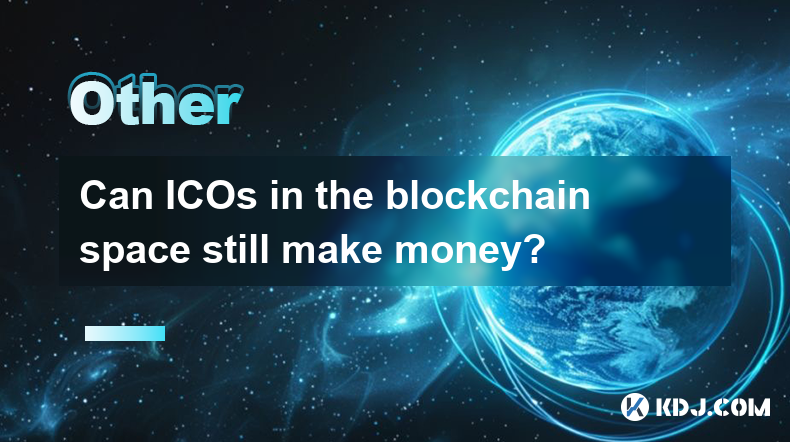
Can ICOs in the blockchain space still make money?
Apr 17,2025 at 08:29pm
The landscape of Initial Coin Offerings (ICOs) in the blockchain space has evolved significantly since their peak in 2017 and 2018. Despite the increased regulatory scrutiny and the rise of alternative fundraising methods like Security Token Offerings (STOs) and Initial Exchange Offerings (IEOs), ICOs can still be a viable way to raise funds and generat...
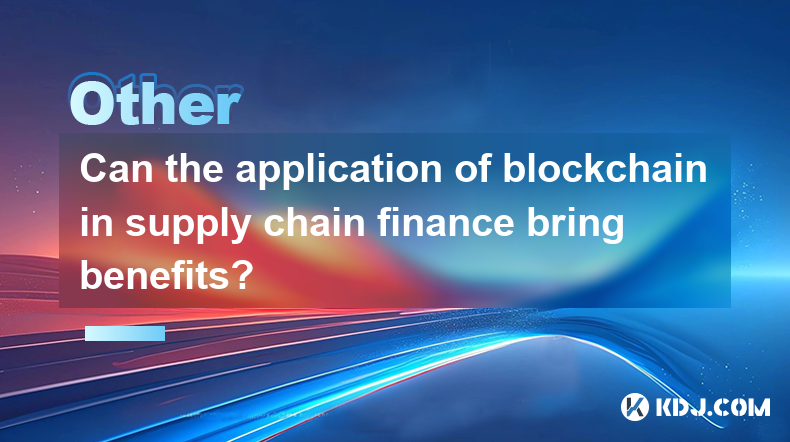
Can the application of blockchain in supply chain finance bring benefits?
Apr 15,2025 at 04:00pm
Can the application of blockchain in supply chain finance bring benefits? The integration of blockchain technology into supply chain finance has garnered significant attention in the cryptocurrency and financial sectors. This article explores how blockchain can potentially revolutionize supply chain finance, detailing its benefits and providing a compre...

Does the ranking of Chinese blockchain apps include cross-chain applications?
Apr 14,2025 at 04:00pm
The ranking of Chinese blockchain apps is a comprehensive evaluation that takes into account various aspects such as user base, transaction volume, and technological innovation. A pertinent question arises regarding whether these rankings include cross-chain applications. Cross-chain applications, which allow different blockchain networks to interact an...
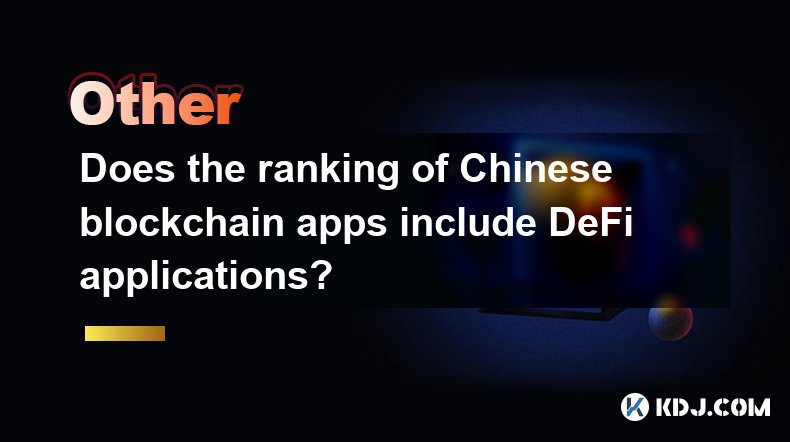
Does the ranking of Chinese blockchain apps include DeFi applications?
Apr 15,2025 at 06:57am
The ranking of Chinese blockchain apps is a comprehensive list that showcases the most popular and influential applications within the cryptocurrency ecosystem. One question that often arises is whether these rankings include DeFi applications. To answer this, we need to delve into the specifics of how these rankings are compiled and what types of appli...
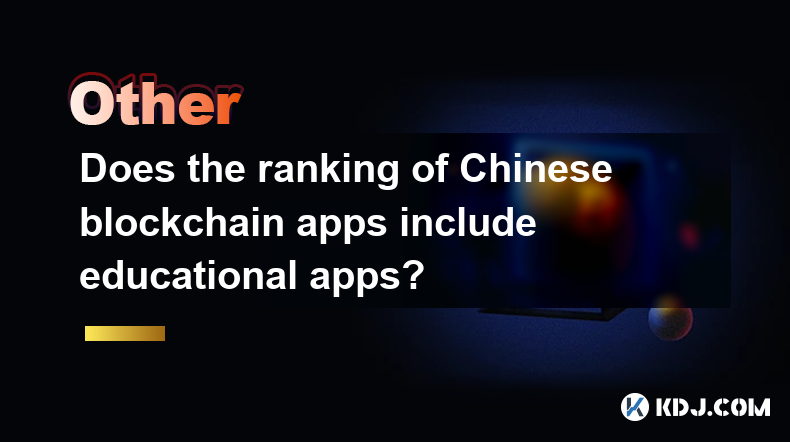
Does the ranking of Chinese blockchain apps include educational apps?
Apr 16,2025 at 03:35am
The ranking of Chinese blockchain apps often includes a variety of categories, from finance and gaming to social networking and beyond. One question that frequently arises is whether these rankings include educational apps. To address this, we need to delve into the specifics of how blockchain apps are categorized and ranked in China, and whether educat...
Does the ranking of Chinese blockchain apps include enterprise-level applications?
Apr 15,2025 at 06:42am
The ranking of Chinese blockchain apps often includes a variety of applications, ranging from consumer-focused to enterprise-level solutions. Understanding the scope and criteria for these rankings is essential to determine if enterprise-level applications are included. This article delves into the specifics of how Chinese blockchain app rankings are co...

Can ICOs in the blockchain space still make money?
Apr 17,2025 at 08:29pm
The landscape of Initial Coin Offerings (ICOs) in the blockchain space has evolved significantly since their peak in 2017 and 2018. Despite the increased regulatory scrutiny and the rise of alternative fundraising methods like Security Token Offerings (STOs) and Initial Exchange Offerings (IEOs), ICOs can still be a viable way to raise funds and generat...

Can the application of blockchain in supply chain finance bring benefits?
Apr 15,2025 at 04:00pm
Can the application of blockchain in supply chain finance bring benefits? The integration of blockchain technology into supply chain finance has garnered significant attention in the cryptocurrency and financial sectors. This article explores how blockchain can potentially revolutionize supply chain finance, detailing its benefits and providing a compre...

Does the ranking of Chinese blockchain apps include cross-chain applications?
Apr 14,2025 at 04:00pm
The ranking of Chinese blockchain apps is a comprehensive evaluation that takes into account various aspects such as user base, transaction volume, and technological innovation. A pertinent question arises regarding whether these rankings include cross-chain applications. Cross-chain applications, which allow different blockchain networks to interact an...

Does the ranking of Chinese blockchain apps include DeFi applications?
Apr 15,2025 at 06:57am
The ranking of Chinese blockchain apps is a comprehensive list that showcases the most popular and influential applications within the cryptocurrency ecosystem. One question that often arises is whether these rankings include DeFi applications. To answer this, we need to delve into the specifics of how these rankings are compiled and what types of appli...

Does the ranking of Chinese blockchain apps include educational apps?
Apr 16,2025 at 03:35am
The ranking of Chinese blockchain apps often includes a variety of categories, from finance and gaming to social networking and beyond. One question that frequently arises is whether these rankings include educational apps. To address this, we need to delve into the specifics of how blockchain apps are categorized and ranked in China, and whether educat...

Does the ranking of Chinese blockchain apps include enterprise-level applications?
Apr 15,2025 at 06:42am
The ranking of Chinese blockchain apps often includes a variety of applications, ranging from consumer-focused to enterprise-level solutions. Understanding the scope and criteria for these rankings is essential to determine if enterprise-level applications are included. This article delves into the specifics of how Chinese blockchain app rankings are co...
See all articles























































































